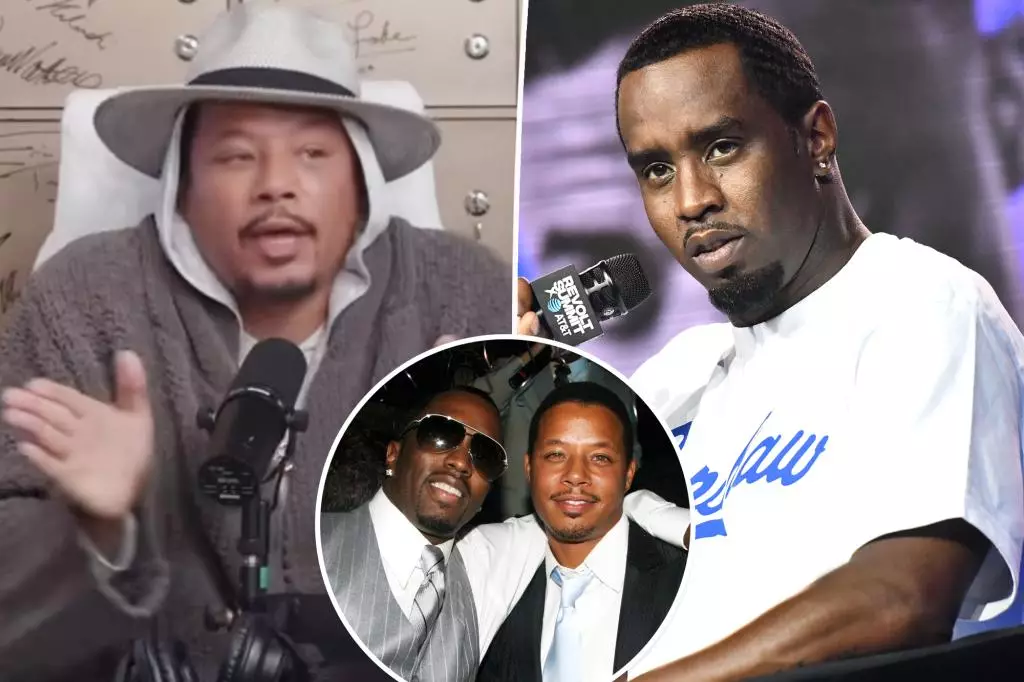In recent revelations that have sent shockwaves across the entertainment industry, actor Terrence Howard has made alarming claims regarding music mogul Sean “Diddy” Combs during an appearance on the “PBD Podcast.” This unveiling comes at a time when Diddy is embroiled in federal sex trafficking allegations, along with multiple sexual assault lawsuits. Howard’s assertions mark a troubling moment, as he alleges that Diddy attempted to seduce him under the guise of professional mentorship. The implications of these accusations not only affect the lives of those directly involved but also reflect the broader issues of power dynamics and sexual misconduct in Hollywood.
During the podcast episode, Howard recounted that Diddy had persistently invited him to serve as an acting coach, suggesting a professional relationship. However, Howard’s experience deviated significantly from this initial premise. His narration indicated a stark discomfort; rather than focusing on crafting performances, Howard found Diddy merely observing him, a behavior that he found unsettling. To interpret such behavior within the often opaque corridors of stardom raises questions about boundaries—especially when the stakes of celebrity culture are at play.
Tension Between Professionalism and Predatory Behavior
Howard’s description of the events escalated in intensity, as he suggested that Diddy was not innocently interested in honing his acting skills but rather had ulterior motives. The pivotal moment came when Howard confided in his assistant about his confusion regarding Diddy’s actions. The assistant’s overtly blunt interpretation—that Diddy might be “trying to f*** you”—prompted Howard to sever their connection. This frank assessment further complicates the narrative, revealing how convenient it is for powerful figures to bend social norms, often to the detriment of others.
The turmoil faced by Howard resonates with the challenges that many individuals encounter when navigating the murky waters of mentorship in industries riddled with abuses of power. With Howard claiming to have thrice confronted predatory advances, one cannot help but wonder how prevalent such behavior is and whether the stakes of fame necessitate an unspoken code of silence among artists and professionals.
Howard’s Masculinity and the Cost of Integrity
In his candid dialogue about these disturbing experiences, Howard emphasized his refusal to compromise his masculinity. He claimed to have lost business opportunities as a result of standing firm against implied demands of conformity. This cultural stance raises crucial discussions about masculinity in Hollywood. Why must a man conform to specific expectations to succeed, and what costs are entailed when he chooses defiance over compliance? Howard’s insistence on not portraying gay roles or engaging in compromising situations resonates profoundly within the industry, yet it exposes a troubling narrative that may discourage diverse representations in film and television.
It’s important to consider Howard’s personal philosophy of masculinity, which posits a “man card” that he defends fiercely. For Howard, this stance is about more than personal conviction; it illustrates the pressures actors face when trying to navigate a tumultuous industry that often conflates professional success with personal sacrifice.
Diddy’s Legal Quagmire and Reactions
The controversy doesn’t stop with Howard’s statements. Diddy stands accused of more than just inappropriate advances; he is embroiled in a multitude of serious allegations that entail sexual violence and human trafficking. In light of these legal battles, Diddy’s vehement denial of Howard’s claims and all other allegations showcases the intricate tapestry of truth and perception in the public eye. His recent legal issues, including the testimony of individuals like Joseph Manzaro—a former associate who claims Diddy facilitated trafficking—add layers of complexity to Howard’s assertions and accentuate the host of women and men who have bravely shared their experiences.
Diddy’s public declaration that these allegations reflect malicious intent by plaintiffs seeking publicity only serves to fuel further discourse about accountability and the ethical ramifications of fame. As Society grapples with the implications of such behaviors among celebrities, it forces us to rethink the norms surrounding celebrity culture and our responsibility as the audience.
As investigations unfold and more stories surface—whether from notable figures or the unheard voices of everyday individuals—the narrative dictates that the voices of survivors should not remain suppressed under the weight of fame. Howard’s unprecedented claims may serve as a catalyst for deeper conversations surrounding victimization and empowerment, pushing the industry toward much-needed reform.

